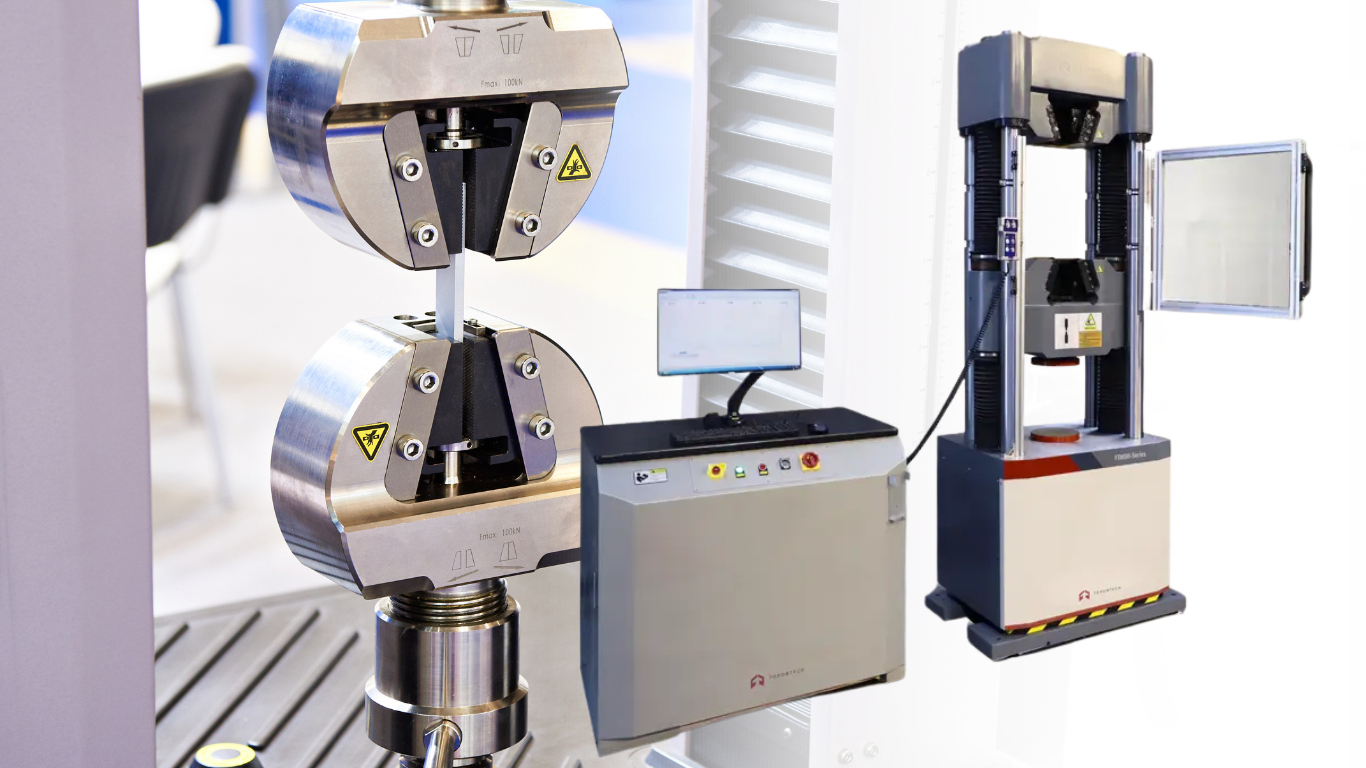UTM Machine: Understanding the Universal Testing Machine for Material Testing
If you work in manufacturing, construction, aerospace, or research, you need to ensure that materials can withstand real-world stresses. Whether testing metals, plastics, composites, or textiles, a UTM Machine, also known as a Universal Testing Machine, helps you measure key mechanical properties like tensile strength, compression, and flexibility.
With growing demands for quality assurance and regulatory compliance, using the right material testing equipment ensures product reliability and safety.
What is a UTM Machine?
A Universal Testing Machine (UTM) is a mechanical testing device used to evaluate the tensile, compressive, and flexural strength of materials. It applies controlled forces to a specimen and records how the material responds under stress.
You can use a UTM machine to perform various tests, including:
- Tensile Testing: Determines how much force a material can withstand before breaking.
- Compression Testing: Evaluates how a material behaves when squeezed under pressure.
- Bending (Flexural) Testing: Measures a material’s ability to resist bending forces.
- Shear Testing: Determines resistance to sliding forces.
- Peel & Adhesion Testing: Assesses the strength of adhesives and bonded materials.
By using a Universal Testing Machine, you gain precise insights into a material’s mechanical behavior, allowing you to make informed decisions in product development, quality assurance, and regulatory compliance.
How Does a Universal Testing Machine Work?
A UTM machine operates by holding a sample between two grips or fixtures. The machine then applies force in a controlled manner—either pulling, pushing, bending, or shearing the material—while sensors measure the reaction.
A load cell measures the force applied, while an extensometer tracks changes in the material’s length. The results are displayed on a connected software system, which records load, displacement, and stress-strain data.
Depending on the type of test, the force may continue until the material breaks or reaches a predefined limit. The data collected provides valuable insights into the material’s strength, elasticity, and failure point, which helps manufacturers make informed decisions about material selection and production processes.
Why Do You Need a UTM Machine?
Material testing is a critical step in product development and quality control. Using a UTM machine ensures that materials meet required performance standards and will function as expected in real-world applications.
This is particularly important in industries such as automotive, aerospace, civil engineering, and medical device manufacturing, where material failure can have serious consequences.
A UTM machine helps you:
- Ensure materials meet regulatory standards such as ASTM, ISO, and DIN.
- Identify defects and weaknesses before materials go into production.
- Improve product reliability by selecting the best materials for specific applications.
- Reduce material waste and optimize production processes.
- Conduct research and development on new materials and composites.
By performing accurate and repeatable tests, a Universal Testing Machine helps you maintain product integrity, customer satisfaction, and industry compliance.
Types of UTM Machines
Different applications require different types of UTM machines. The two main categories are electromechanical and servo-hydraulic UTMs.
1. Electromechanical UTM Machines
These machines use a motor-driven lead screw to apply force, making them ideal for low-to-medium force applications such as plastics, textiles, rubbers, and thin metals. They offer high precision, easy operation, and smooth control, making them suitable for laboratory and research settings.
2. Servo-Hydraulic UTM Machines
Hydraulic UTMs use a hydraulic actuator to apply force, making them ideal for high-force applications such as testing metals, concrete, and composites. These machines can handle extreme loads, making them essential in automotive, aerospace, and construction industries where large-scale materials need to be tested.
Industries That Use Universal Testing Machines
A Universal Testing Machine is widely used in industries where material strength and performance are critical.
- Automotive & Aerospace: Ensures that materials used in vehicles, aircraft, and structural components can withstand extreme stress and loads.
- Construction & Civil Engineering: Verifies the strength of concrete, steel, and other building materials to meet safety standards.
- Plastics & Polymers: Tests the durability and flexibility of plastic products, films, and elastomers.
- Medical & Biomechanics: Evaluates the mechanical properties of medical implants, prosthetics, and biomaterials.
- Textiles & Paper Industry: Measures tensile strength, elongation, and tear resistance of fabrics and paper materials.
If you work in any of these industries, investing in a UTM machine helps you maintain product consistency and avoid material failures.
Key Factors to Consider When Choosing a UTM Machine
Selecting the right Universal Testing Machine depends on several factors. First, consider the type of materials you need to test and the force range required. For soft materials like polymers and textiles, an electromechanical UTM with lower force capacity is ideal. For metals, composites, and construction materials, a servo-hydraulic UTM with higher force capabilities is a better choice.
Accuracy and precision are also crucial. High-resolution load cells and extensometers ensure that measurements are reliable. Additionally, automation features such as digital data acquisition, software integration, and automated reporting can improve efficiency, especially in high-volume testing environments.
Compliance with industry standards is another important factor. Ensure that your UTM machine meets the requirements of ASTM, ISO, and other material testing regulations to guarantee accurate and recognized results.
Final Thoughts
A UTM Machine, or Universal Testing Machine, is a vital tool for assessing the strength, flexibility, and durability of materials. Whether you work in manufacturing, construction, aerospace, or research, using a UTM ensures that materials meet the required performance and safety standards before they are used in real-world applications.
By investing in accurate and reliable material testing, you can make better decisions about product design, material selection, and quality control. Whether you need to test metals, plastics, composites, or textiles, a Universal Testing Machine provides the insights you need to enhance efficiency, safety, and reliability in your industry.






